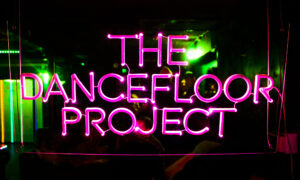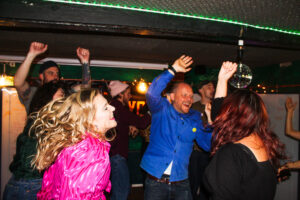The Dancefloor Project is a collaboration between York-based creative projects community interest company, Bolshee, and psychology academics at York St John University. Funded through the ISJ’s Community Research Grants, the project seeks to creatively and collaboratively explore how people feel in public spaces, what makes them feel safe and develop preventative materials to help make public spaces safer for all.
In this blog we explore the experience of this innovative art/researcher collaboration.
The Bolshee team is made up of three experienced, energised creatives with professional backgrounds from theatre production, dance, events and community practice; Megan Bailey, Paula Clark and Lizzy Whynes.
From York St John, psychology academics Anna Macklin, Jenn Cassarly, Melanie Douglass forms the team, with the added input of student researchers Emily Howarth (BA BSL, Deaf Studies & Linguistics) and Olivia Stipetic (BSc Psychology). The project also connects to the University’s ongoing All About Respect initiative.
The project embraces an innovative, immersive methodology and data collection process. Through a series of pop-up dancefloors across York, everyone is invited to write their dancefloor demands on a lit up disco board. Questions are posed in the dancefloor space such as: ‘What makes you feel safe? How do you get home after a night out? How do you want to be treated in public spaces?’ There is a plan to follow this up with focus groups in the second phase of the project, which will further explore issues of consent and public space safety.
With two dancefloor events under their dancing shoes, the project team are looking forward to seeing what new locations and participant groups bring.
A unique partnership
The project is a unique example of supposed opposites coming together to create something impactful: posing pressing and serious questions within the unlikely context of the lively, fun-fueled dance floor; embedding personal demands and reflections within a public space; fusing artists and academics to bring their own distinct skills and approaches to one collaborative venture.
The starting point for this collaboration was a shared long-term investment in creating change and addressing the issue of sexual harm in public spaces. Academics and artists aligned in their desire to unravel the complexity of what it is to ‘feel safe’ through positive experiences and messaging.
Why a Dancefloor?
When asked why the dance floor seemed a fitting place to explore these issues, Bolshee’s Creative Producer Megan Bailey explained:
“The dancefloor can and should be a space of fun and freedom. We are however often reminded of the sexualization and danger of such spaces. We wanted to invite people to imagine a space within which they did not have to worry and ask ourselves as artists and activists how we could achieve that.”
Paula, Bolshee Creative Director, added: “The whole idea of inviting people to the dancefloor is that we are offering people an experience and a starting point for conversations between different or shared perspectives. By opening a dancefloor, we are part of the cultural landscape itself and hopefully this allows people to engage with important questions in a new way.”
Academics and artists co-learning
For academic Anna Macklin, the collaborative set-up has taken her into new spaces and challenged her to think of new implications, language uses and really get ‘out of the lab’.
Anna said: “Whilst our practices seem poles apart, there is a shared passion to make positive change and address issues we have all cared about deeply for years, in our own professions. It is great to appreciate new methodologies and ways of working to address the same research question and the teams are learning from each other.”
In a practical sense, the project has operated through online meetings, content sharing and, more recently, dancefloor events where the full project team comes together.
Given the nature of the project in addressing serious public issues, University research ethics approval was an early key stage in getting the project off the ground. This was an intense process, requiring patience and mutual learning between artists and academics. Paula from Bolshee stated: “Whilst we have undergone ethics approval in the past, and take safeguarding very seriously, working with academics has opened our practices to new helpful insights.”
Next dancing steps
The project has dancefloor events throughout March and April where data will be gathered. This includes the anonymous writing people leave on the dancefloor boards, as well as interactive maps and ballot boxes where people can share their own personal experiences. This data will go on to inform materials which can be shared and distributed to public venues across the city.
Anna said: “We hope this project brings a more nuanced perspective to what can make people feel safe / unsafe on a night out and how others can help create feelings of safety. It can be subtle messages that can lead to unconscious shifts in behavior that impact the feeling of safety for all. Opening conversations around public safety and the role we can all play is what we hope to achieve.”
Overall, Bolshee are excited by the prospect of showcasing their work and impact through new methodologies – including academic qualitative data. Working with the university in this way, Paula regards it as an opportunity to navigate the tricky world of ‘proving’ artistic impact and open their work to a new audience.
Advice to community groups
As the ISJ prepare to elicit proposals for a new set of Community Research Grants, we were interested in what advice this project might have for other potential University/Community collaboration. One was the importance of establishing a clear and shared timeline. Whilst this may seem simple enough, arts and academic timescales may differ significantly, with different demands and expectations at different times. Finally, remaining open to new experiences will allow the project to grow in an exciting, meaningful direction.
Applications for the 2023 ISJ Community Research Grants will be launched 1 March, with a deadline of the 28 April. Visit our website for further information on how to submit a proposal.
